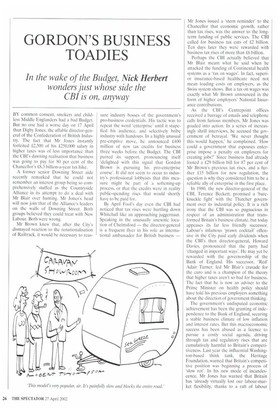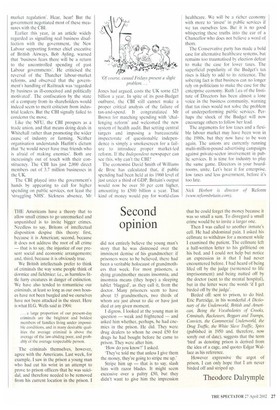GORDON'S BUSINESS TOADIES
In the wake of the Budget, Nick Herbert
wonders just whose side the
CBI is on, anyway
BY common consent, smokers and childless Middle Englanders had a bad Budget. But no one had a worse day on 17 April than Digby Jones, the affable director-general of the Confederation of British Industry. The fact that Mr Jones instantly forfeited £2,500 of his £250.000 salary in higher taxes was of less importance than the CBI's dawning realisation that business was going to pay for 80 per cent of the Chancellor's £8.3 billion-a-year tax hike.
A former senior Downing Street aide recently remarked that he could not remember an interest group being so comprehensively stuffed as the Countryside Alliance in its attempt to do a deal with Mr Blair over hunting. Mr Jones's head will now join that of the Alliance's leaders on the walls of Downing Street. Both groups believed they could treat with New Labour. Both were wrong.
Mr Brown knew that, after the City's dismayed reaction to the renationalisation of Railtrack, it would be necessary to reas sure industry bosses of the government's pro-business credentials. His tactic was to repeat the word 'enterprise until it stupefied his audience, and selectively bribe industry with handouts. In a highly unusual pre-emptive move, he announced £400 million of new tax credits for business three weeks before the Budget. The CBI purred its support. pronouncing itself 'delighted with this signal that Gordon Brown is pursuing his pro-enterprise course'. It did not seem to occur to industry's professional lobbyists that this measure might be part of a softening-up process, or that the credits were in reality public-spending rises that would shortly have to he paid for.
By April Fool's day even the CBI had noticed that tax rises were hurtling down Whitehall like an approaching juggernaut. Speaking in the unusually unexotic location of Chelmsford — the director-general is a frequent flyer in his role as international ambassador for British business — Mr Jones issued a 'stern reminder' to the Chancellor that economic growth, rather than tax rises, was the answer to the longterm funding of public services. The CBI called for business tax cuts of 12 billion. Ten days later they were rewarded with business tax rises of more than 16 billion.
Perhaps the CBI actually believed that Mr Blair meant what he said when he attacked the funding of Continental health systems as a 'tax on wages'. In fact, superior insurance-based healthcare need not mean loading costs on employers, as the Swiss system shows. But a tax on wages was exactly what Mr Brown announced in the form of higher employers' National Insurance contributions.
As the CBI's Centrepoint offices received a barrage of emails and telephone calls from furious members. Mr Jones was goaded into action. In a series of increasingly shrill interviews, he accused the government of betrayal. 'We never thought this would happen,' he complained. 'How could a government that espouses enterprise impose a penalty on employers for creating jobs?' Since business had already footed a £29 billion bill for 87 per cent of Mr Brown's previous tax rises, and a further £15 billion for new regulation, the question is why they considered him to be a reliable ally of enterprise in the first place.
In 1980, the new director-general of the CBI, Terence Beckett, promised a 'bareknuckle fight' with the Thatcher government over its industrial policy. It is a rich irony that the CBI was so pugnacious in respect of an administration that transformed Britain's business climate, but today appeases its far less friendly successor. Labour's infamous 'prawn cocktail' offensive in the City paid early dividends when the CBI's then director-general, Howard Davies, pronounced that the party had 'changed in important ways'. He may yet be rewarded with the governorship of the Bank of England. His successor. 'Red' Adair Turner, led Mr Blair's crusade for the euro and is a champion of the theory that higher taxes aren't so bad for business. The fact that he is now an adviser to the Prime Minister on health policy should have told his previous employers something about the direction of government thinking.
The government's undisputed economic achievement has been the granting of independence to the Bank of England, securing a stable business climate of low inflation and interest rates. But this macroeconomic success has been abused as a licence to pursue a costly social agenda, driving through tax and regulatory rises that are cumulatively harmful to Britain's competitiveness. Last year the influential Washington-based think tank, the Heritage Foundation, warned that Britain's competitive position was beginning a process of 'slow rot'. In his new mode of incandescence, Mr Jones has warned that Britain has 'already virtually lost our labour-market flexibility, thanks to a raft of labour market regulation'. Hear, hear? But the government negotiated most of these measures with the CBI.
Earlier this year, in an article widely regarded as signalling real business disaffection with the government, the New Labour supporting former chief executive of British Ainvays, Bob Ayling, warned that 'business fears there will be a return to the uncontrolled spending of past Labour governments'. He criticised the reversal of the Thatcher labour-market reforms, and observed that the government's handling of Railtrack was 'regarded by business as ill-conceived and politically motivated'. The confiscation by the state of a company from its shareholders would indeed seem to merit criticism from industrial leaders. But the CBI signally failed to condemn the move.
Like the NFU, the CBI prospers as a trade union, and that means doing deals in Whitehall rather than promoting the wider cause of industry or farming. Neither organisation understands Hazlitt's dictum that he would never have true friends who is afraid of making enemies'. Both are increasingly out of touch with their constituency. The CBI has just 2,000 direct members out of 3.7 million businesses in the UK.
The CBI played into the government's hands by appearing to call for higher spending on public services, not least the 'struggling NHS'. Sickness absence, Mr
Jones had argued, costs the UK some £23 billion a year. In spite of its post-Budget outburst, the CBI still cannot make a proper critical analysis of the failure of tax-and-spend. It congratulated Mr Brown for matching spending with 'challenging reform' and welcomed the new system of health audit. But setting central targets and imposing a bureaucratic inspectorate of questionable independence is simply a smokescreen for a failure to introduce proper market-led reform. If the Independent newspaper can see this, why can't the CBI?
The economist David Smith of Williams de Broe has calculated that, if public spending had been held at its 1960 level of just under a third of GDP, Britain's output would now be over 50 per cent higher, amounting to £500 billion a year. That kind of money would pay for world-class healthcare. We will be a richer economy with more to 'invest' in public services if we tax ourselves less. But it is no good whispering these truths into the ear of a Chancellor who does not believe a word of them.
The Conservative party has made a bold case for alternative healthcare systems, but remains too traumatised by election defeat to make the case for lower taxes. The superficial popularity of the Budget's tax rises is likely to add to its reticence. The sobering fact is that business can no longer rely on politicians to make the case for the enterprise economy. Ruth Lea of the Institute of Directors has been almost a lone voice in the business community, warning that tax rises would not solve the problem of underperforming public services. Perhaps the shock of the Budget will now encourage others to follow her lead.
The arguments for low taxes and a flexible labour market may have been won in the 1980s, but they now have to be won again. The unions are currently running multi-million-pound advertising campaigns against private-sector involvement in public services. It is time for industry to play the same game. Directors in your boardrooms, unite. Let's hear it for enterprise, low taxes and less government, before it's too late.
Nick Herbert is director of Reform (www.reformbritain.corn).



































































 Previous page
Previous page